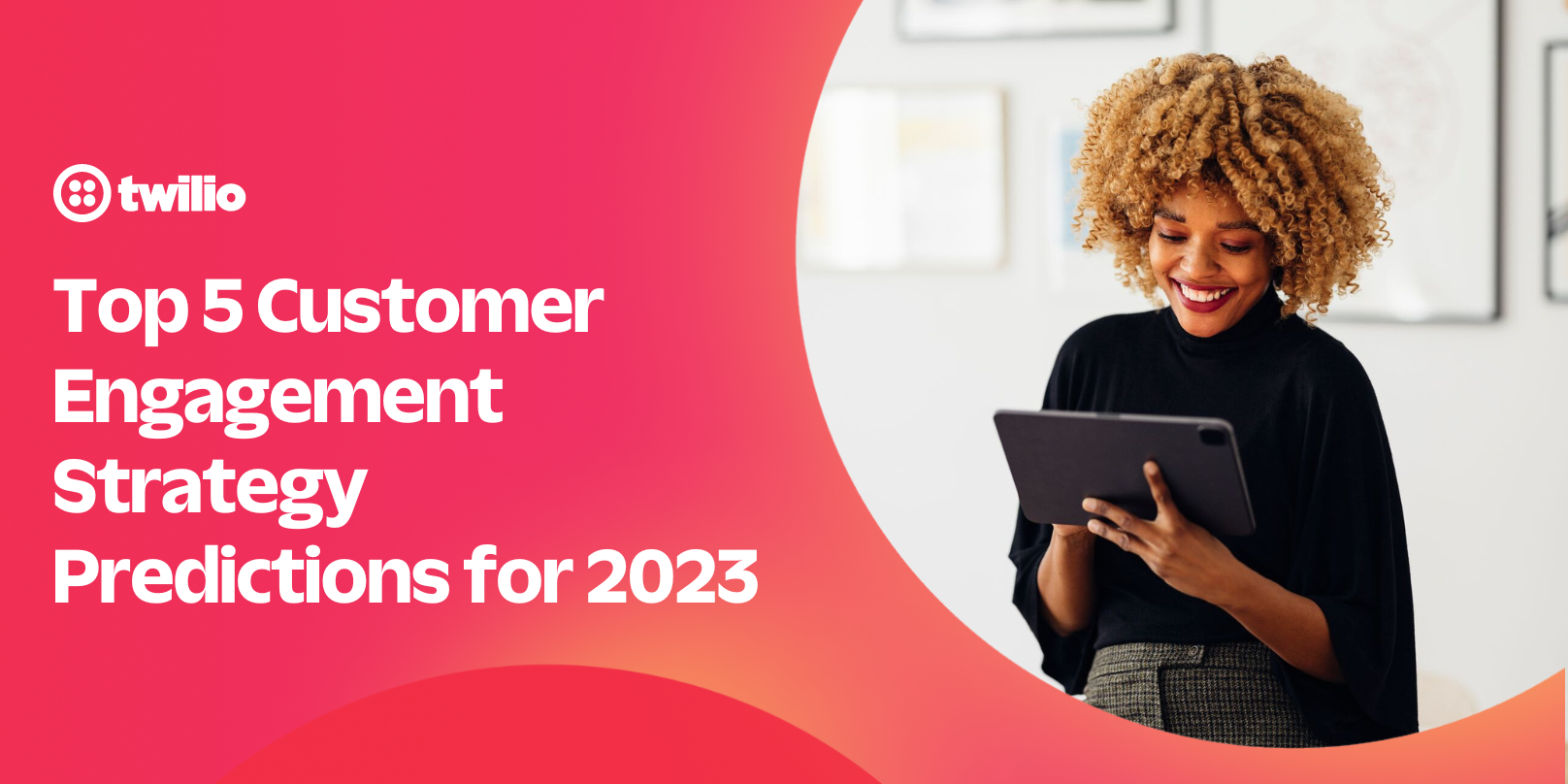Top 5 Customer Engagement Strategy Predictions for 2023
Time to read: 5 minutes

With the current economic climate impacting every customer engagement strategy, businesses of all sizes and across industries need to consider trends for the upcoming year in order to adapt. As leaders in customer engagement, we’ve compiled our top five predictions for how customer engagement strategies will need to adapt in 2023 to help organizations better connect with customers and see tangible business results.
1. Efficient customer acquisition and retention will be a top priority
As economic headwinds impact businesses everywhere, budgets continue to be scrutinized. Organizations must focus on what truly moves the needle, that’s why driving efficient customer acquisition and maximizing customer lifetime value are now key focal points for teams working to drive an impactful customer engagement strategy.
Excellent customer engagement enables organizations to do just that, but it hinges on a business being able to truly understand its customers. That’s where data is crucial. By collecting and synthesizing real-time data, brands can build robust customer profiles that tell marketing, sales, and support teams exactly how, when, and where to interact with customers for the most impact. This kind of data can be activated through any customer-facing channel, allowing teams to deliver unique, tailored customer journeys that turn prospects into customers, and customers into brand advocates.
In this economic climate, brands need to acquire and retain customers efficiently, plus understand which tactics really move the needle. That way, they know where to double down, and when to pivot if they’re not seeing the right results.
2. Precision becomes essential in personalization
We know personalization is important. But precision, or how accurate your personalization is, that’s becoming just as crucial to driving customer loyalty within a customer engagement strategy.
Say a shoe brand targets you with sandal ads based on the warm weather in your zip code, not realizing you’re a huge sneakerhead. Wouldn’t you rather shop with the brand who prioritizes earning your trust and asks what footwear you’re actually into?
All signs point to yes, which is why first-party data—transactional data like your name and address—is being eclipsed by zero-party data, which is data you choose to share that shows brands who you are and what you love. When brands earn that trust, they can become each customer’s trusted advisor, deliver amazing experiences, and drive brand advocacy.
If you could share your preferences with a trusted brand, they could text you when that pair of white sneakers you’ve been eyeing for three weeks finally goes on sale. That helps the brand build a deeper and more durable relationship with a customer.
3. Transparency and trust will become non-negotiable
Shifts in consumer preferences are now driving companies to change how they collect and use data. The majority of consumers want personalized engagement from companies, but only if it comes with transparency and control.
If businesses want to build consumer trust, they must be honest about how they plan to use consumer data and provide them with enough control of their own information. That kind of trust becomes even more important when you consider the imminent deprecation of third-party cookies, now planned for 2024.
Eighty-one percent of companies in our 2022 State of Customer Engagement report said they still rely on third-party data in their marketing strategies. However, cookies and other tracking technologies have been under threat for many years due to their invasive nature. They enable a hidden, pervasive way of tracking that consumers don’t fully understand. A combination of increased regulation, consumer demand for trust, enforcement action, and withdrawal by big tech companies has led to the demise of cookies.
According to research firm Forrester, “When individuals have a higher trust in a company, it results in higher revenue and deeper engagement, and customers are more willing to forgive mistakes and to share their personal data.” The International Data Corporation (IDC), a premier global provider of market intelligence, corroborates the importance of trust, stating that by 2027 “enterprises that collect, analyze, and contextualize customer data in a trustworthy way will successfully build creative business and pricing models that double customer lifetime value.”
To develop that trust, brands need to ensure they’re consistently respecting customers’ data preferences, especially by complying to data regulations and only engaging customers who want to be engaged. This improves customer trust and also increases call, email, and SMS deliverability for companies, improving the overall ROI of a customer engagement strategy.
4. Customer service will become proactive rather than reactive
We’ve all had frustrating customer service experiences where an agent asks you to share the same information over and over. The agent has no context from your previous interactions, so you’re left retelling your story. For example, when an airline cancels your flight, you have to provide your confirmation number multiple times throughout the rebooking process. Wouldn’t it be nice if the airlines’ customer service rep had all that information at their fingertips? Or even better, if they actually reached out to you to rebook your canceled flight?
Proactive engagement is the future of customer service. Customers will expect service experiences that predict their needs and proactively address them. That proactive approach also extends beyond issue resolution. In-app and website experiences will need to engage customers before purchase in order to build trust and increase conversion overall within a customer engagement strategy.
5. Consumers will demand cohesive omnichannel experiences
In recent years we’ve seen a steep increase in the number of engagement channels customers use to interact with brands. As a result, the customer journey has become even more non-linear, making it challenging for brands to show customers they really understand them.
Let’s go back to our sneaker example. Maybe in the past you’d go to the brand’s website, read a review, and purchase. Now? You might go to the sneaker brand’s website, decide the price isn’t right, come back weeks later, reach out to customer service to ask a question, add to cart, navigate away again, see an ad elsewhere, and then purchase the shoes in a physical store. It can be difficult for the brand to anticipate your next move so they can deliver the right content at the right time across different touchpoints to make you feel understood.
In short, a brand’s customer engagement strategy needs to be able to keep up, delivering experiences that anticipate every individual’s needs across different channels. According to the IBM Research Insights report, "Today’s customers are diverse in how they shop—but they’re united in their expectation that retailers and brands be present and ready to serve them wherever they are— physically, contextually, and at every point in their journey.”
And with current economic conditions, mastering an omnichannel customer engagement strategy becomes an even more important differentiator. That’s why Forrester advises brands to not expect consumers “to be shy about spending in 2023. But expect them to be far pickier—seeking out fewer, richer experiences that blend the digital fluidity of the pandemic with the familiarity and intimacy of the times that came before.”
Customer engagement strategies will undoubtedly change in the year to come. Companies that are able to see ahead and adapt are the ones that will thrive. Twilio provides the tools and expertise that businesses need to overcome these challenges and develop deep, durable relationships with customers. Learn more about how Twilio’s Customer Engagement Platform can help.
Steph Dollan is a Senior Product Marketing Manager at Twilio, focused on all things related to Twilio's Customer Engagement Platform (CEP). She loves talking about how enterprises can build deep customer relationships and make their brand indispensable through innovative customer engagement. She can be reached at sdollan [at] twilio.com.
Related Posts
Related Resources
Twilio Docs
From APIs to SDKs to sample apps
API reference documentation, SDKs, helper libraries, quickstarts, and tutorials for your language and platform.
Resource Center
The latest ebooks, industry reports, and webinars
Learn from customer engagement experts to improve your own communication.
Ahoy
Twilio's developer community hub
Best practices, code samples, and inspiration to build communications and digital engagement experiences.


